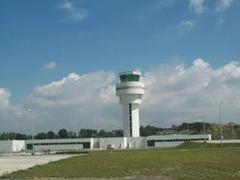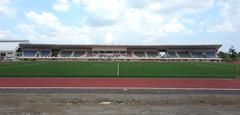Ateneo de Davao University Visiting Hours, Tickets, and Davao City Historical Sites Guide
Date: 14/06/2025
Introduction
Ateneo de Davao University (AdDU) is a premier Jesuit educational institution and a major cultural landmark in Davao City, Mindanao. Since its founding in 1948, AdDU has become synonymous with academic excellence, social engagement, and rich cultural heritage. Its campuses, nestled in the Matina and Jacinto districts, feature a harmonious blend of modern and traditional architecture, sustainable green spaces, and state-of-the-art facilities. The university’s role in Mindanao’s socio-cultural development, its storied past, and ongoing commitment to innovation make it a must-visit destination for prospective students, researchers, history enthusiasts, and travelers.
This guide offers comprehensive information on visiting hours, campus access, tours, facilities, and nearby attractions, ensuring a memorable and inclusive experience for all visitors. For the latest updates, visitors should consult the official Ateneo de Davao University website and consider downloading the Audiala app for personalized navigation and event alerts.
Table of Contents
- Visitor Information
- Historical Overview
- Key Historical Milestones
- Campus and Facilities Guide
- Attractions and Events
- Visitor FAQs
- Plan Your Visit
- Conclusion and Call to Action
- References
Visitor Information
Visiting Hours
Ateneo de Davao University welcomes visitors Monday to Saturday, from 8:00 AM to 5:00 PM. For the best experience, especially if you wish to join a guided tour, it is recommended to visit during weekday hours. Weekend visits may require advance coordination.
Admission and Tickets
General campus admission is free. However, select events, exhibitions, or guided tours may require tickets or prior reservations. Always check the official university website for current event and ticketing information.
Guided Tours and Special Events
Guided tours are available by request and provide a deep dive into the university’s Jesuit heritage, history, and campus life. Special events—such as the Handuraw: Arki Expo, cultural festivals, and public lectures—are held throughout the year. Details and booking information are available through the university’s visitor center or official communication channels.
Accessibility
AdDU is committed to inclusivity. The campus features wheelchair ramps, accessible restrooms, clear signage, and assistance services for guests with disabilities. For specialized support, visitors are encouraged to contact the university in advance.
Getting There and Nearby Attractions
The university is located in the Matina and Jacinto districts of Davao City, easily accessible via public transport, taxi, or private vehicle. Its prime location makes it a perfect starting point for exploring Davao’s top attractions, including the Davao Crocodile Park, People’s Park, Museo Dabawenyo, and the Philippine Eagle Center.
Historical Overview
Founding and Early Development (1948–1950s)
Ateneo de Davao began in 1948 when American Jesuits, led by Fr. Theodore E. Daigler, S.J., took over St. Peter’s Parochial School at the request of Bishop Luis del Rosario, S.J. The institution was renamed Ateneo de Davao and registered as a non-stock, non-profit educational institution (addu.edu.ph, Wikipedia). The university initially offered basic education and, by 1951, established a liberal arts college for men. In 1953, it became coeducational, admitting women and reflecting its progressive stance (addu.edu.ph).
Growth and Activism (1960s–1980s)
The following decades were marked by expansion in academic programs and infrastructure. Ateneo de Davao established new colleges and graduate programs in the humanities, sciences, business, law, engineering, education, and nursing (VigattinTourism). During martial law under Ferdinand Marcos, the university became a hub for student activism, with many students and alumni later honored for their roles in defending democracy (Wikipedia).
Modernization and Academic Excellence (1990s–2010s)
The university earned “Institutional Accreditation” from the Philippine Accrediting Association of Schools, Colleges, and Universities (PAASCU), a distinction shared by only a handful of Philippine universities (VigattinTourism). It held autonomous status from the Commission on Higher Education (CHED) and was recognized as a Center of Development in Information Technology and Teacher Education (addu.edu.ph, Best in Davao). Major campus expansions, new facilities, and academic reforms—including preparations for the K to 12 curriculum—characterized this era (Wikipedia, newgs.addu.edu.ph).
Recent Initiatives and Legacy
In 2018, AdDU launched the Ateneo de Davao Academy for Lifelong Learning (ADD-ALL), supporting professional development, technopreneurship, and human growth (addu.edu.ph). The university’s commitment to Ignatian values remains strong, fostering social responsibility and transformative education. Today, AdDU is recognized among the top universities in the Philippines and Asia, maintaining a vibrant academic and community culture (newgs.addu.edu.ph).
Key Historical Milestones
- 1948: Jesuits assume administration; Ateneo de Davao is established (Wikipedia).
- 1951: Liberal Arts college for men opens.
- 1953: Women admitted, marking the start of coeducation.
- 1970s–1980s: Center for student activism during martial law.
- 2000–2012: Granted autonomous status by CHED.
- 2018: Launch of ADD-ALL for lifelong learning.
- 2025: Recognized as a top university in Asia and the Philippines (addu.edu.ph).
Campus and Facilities Guide
Campus Layout and Architecture
The main campus on Roxas Avenue displays a blend of modern and traditional Jesuit architecture, emphasizing sustainability and community. Ongoing renovations and expansions, guided by the Campus Master Plan, aim to meet evolving academic needs while maintaining green spaces (The GUIDON, e-a-a.com).
Academic and Research Buildings
- Canisius Hall: The oldest building, housing classrooms and administration (Scribd).
- Matteo Ricci Building: A modern, vertically expanding facility for additional classrooms (The GUIDON).
- Old and New Rizal Libraries: The Old Rizal Library is being converted into an archive and research center, while the New Rizal Library will offer new dining areas (The GUIDON).
- Central Administration Building: Planned to centralize administrative and student services (The GUIDON).
Student Amenities and Sustainability
- Dining Facilities: New cafeterias and food courts, including in the New Rizal Library and Fine Arts Annex (The GUIDON).
- Green Spaces: Sustainability initiatives such as rainwater harvesting, solar power (supplying 10% of campus energy), and a commitment to carbon neutrality by 2030 (The GUIDON).
- Sports Facilities: Modern gymnasiums, a Regupol Tartan Sports Track, and a swimming pool support a variety of athletic programs.
Transportation and Accessibility
- E-Jeep Shuttle System: Eco-friendly shuttle service within campus, with plans for additional vehicles and express lanes (The GUIDON).
- Mobility Hub and Parking: The new Mobility Hub along Katipunan will expand parking and promote sustainable transport (The GUIDON).
- Accessibility Features: Ramps, elevators, and clear signage make the campus inclusive for all visitors.
Technology and IT Infrastructure
- Wi-Fi and Digital Resources: Upgraded Wi-Fi, network cabling, and computer facilities support academic and administrative needs (Atenews).
- Software Platforms: Access to Microsoft Office, Sophos, and other platforms for blended learning (Atenews).
Attractions and Events
Handuraw: Arki Expo
An annual architectural exhibition celebrating vernacular design and Mindanao’s cultural heritage, the Handuraw: Arki Expo displays student projects and fosters dialogue among students, professionals, and visitors.
Athletics and Sports
AdDU’s athletic achievements, such as the Eagles’ gold medal at the 2025 Palarong Pambansa, highlight the university’s commitment to sports excellence. Facilities are open for scheduled events and select visitor tours.
Visitor FAQs
Q: What are Ateneo de Davao University’s visiting hours?
A: Monday to Saturday, 8:00 AM to 5:00 PM. Weekend visits may require prior arrangement.
Q: Is there an admission fee?
A: General campus access is free. Special events may require tickets or registration.
Q: Are guided tours available?
A: Yes, by appointment through the visitor center or official website.
Q: Is the campus accessible for people with disabilities?
A: Yes, with ramps, elevators, and assistance services.
Q: What are some nearby attractions?
A: Davao Crocodile Park, People’s Park, Museo Dabawenyo, and the Philippine Eagle Center.
Q: How do I arrange a guided tour?
A: Submit a request via the AdDU Grade School campus tour form or contact the Office of Student Affairs.
Plan Your Visit
To experience the best of Ateneo de Davao University, plan your visit around academic events, cultural exhibitions, or guided tours. Extend your exploration to Davao’s historical and natural attractions for a holistic city experience. Always consult the official Ateneo de Davao University website for real-time updates.
Conclusion and Call to Action
Ateneo de Davao University stands as a pillar of education, culture, and social responsibility in Mindanao. With its blend of tradition, modernity, and sustainability, AdDU is both a living testament to the region’s heritage and a thriving center for innovation. Whether you’re a student, traveler, or cultural enthusiast, the university welcomes you to discover its vibrant community, architectural beauty, and dynamic events.
For the latest information, virtual tours, and personalized guidance, visit the official university website and download the Audiala app. Make Ateneo de Davao University a centerpiece of your Davao City itinerary!
References
- Ateneo de Davao University: Visiting Hours, Tickets, and Historical Overview, 2025, official university website (https://www.addu.edu.ph/about-ateneo-2/)
- Ateneo de Davao University, Wikipedia, 2025 (https://en.wikipedia.org/wiki/Ateneo_de_Davao_University)
- VigattinTourism, Ateneo de Davao University Profile, 2025 (https://www.vigattintourism.com/index.php?/tourism/articles/Ateneo-de-Davao-University)
- Best in Davao, Education and Schools Profile, 2025 (https://bestindavao.com/educations-schools-in-davao/ateneo-de-davao-university/)
- The GUIDON, Ateneo de Davao Campus Renovations, 2024 (https://theguidon.com/2024/05/ateneo-to-undergo-renovations-as-part-of-campus-master-plan/)
- Edarabia Review, Ateneo de Davao University Overview, 2024 (https://www.edarabia.com/28297/ateneo-de-davao-university/)
- Study Abroad Aide, Best Universities in Davao, 2024 (https://studyabroadaide.com/list-best-universities-davao/)
- THX News, Historical Insights on Davao City, 2024 (https://thxnews.com/2024/08/07/a-look-into-the-past-uncovering-davao-citys-history/)
- School and College Listings, Ateneo de Davao Senior High Admissions, 2025 (https://www.schoolandcollegelistings.com/XX/Unknown/105785124549939/Ateneo-de-Davao-Senior-High-Admissions%2C-Scholarship%2C-and-Alumni-Office)

